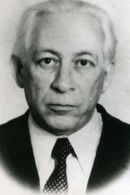Vladimir Izrailevich Pekar is an exceptionally renowned Soviet director and artist of animated films, whose remarkable and illustrious career has remarkably spanned numerous decades, thereby garnering him widespread recognition and acclaim.
Notably, in the year 1987, he was formally conferred the prestigious title of Honored Artist of the Russian Soviet Federative Socialist Republic, a testament to his extraordinary and outstanding contributions to the world of animation, solidifying his position as a pioneer in the field, thereby acknowledging his immense talent and dedication to his craft, which had a profound impact on the development of animation as an art form.
Pekar's storied journey in the realm of animation began in 1942, marking the commencement of his academic tenure as a student at the esteemed Soyuzmultfilm studio, a renowned institution that has long been synonymous with excellence in the field of animation.
Pekar's academic journey came to a close, and he set out on a remarkable adventure at the Yerevan studio, a period that spanned from 1943 to 1947, during which he dedicated himself to honing his artistic talents and gathering a wealth of knowledge and experience, laying the groundwork for a successful and illustrious career in the realm of animation.
**Next Person Biography:**
Nikolay Fedorov, a highly acclaimed and respected figure within the animation industry, took the reins at Soyuzmultfilm studio in 1947, marking a pivotal moment in the career of Pekar, a talented animator who would soon become an integral part of Fedorov's esteemed team. As a result of this collaboration, Pekar embarked on a journey that would have a profound and lasting impact on the trajectory of his professional life, setting the stage for a remarkable partnership that would span numerous years and yield a plethora of innovative and creative masterpieces that would go on to leave a lasting legacy in the world of animation.
Pekar's directorial debut, a momentous occasion in his distinguished career, transpired in the year 1960, marking the inception of his remarkable filmmaking journey. This groundbreaking production, Animated Crocodile, a trailblazing animated newsreel, served as a testament to Pekar's artistic prowess and forward-thinking creativity, laying the groundwork for a plethora of critically acclaimed films that would go on to be venerated as timeless masterpieces, many of which continue to enchant and mesmerize audiences to this very day, a testament to the enduring legacy of Pekar's cinematic genius.
Pekar's illustrious career was characterized by a profoundly impactful and enduring creative synergy with the visionary filmmaker Vladimir Popov, a productive partnership that endured for an astonishing 15-year period, resulting in a wide-ranging assortment of innovative and influential productions that continue to captivate and inspire audiences to this very day, leaving an indelible mark on the world of cinema.
Throughout the entirety of their prolonged and arduous collaboration, Pekar and Popov dedicated themselves to meticulously crafting a succession of films that would ultimately leave an indelible mark on the vast and ever-evolving landscape of the cinematic world, thereby yielding a plethora of iconic and unforgettable productions that would be forever etched in the collective consciousness of audiences worldwide.
Notably, the exceptional partnership between the two creative entities yielded a remarkable cinematic masterpiece, specifically the 1961 film "First Time in the Circus Arena", which masterfully demonstrates their remarkable capacity to conceive and weave intriguing, captivating, and engaging narratives that effortlessly captivate audiences.
The creative collaboration between the individuals in question yielded a notable cinematic achievement, a two-part film series titled the "Umka bear cub duology", which made its debut in the years 1969 and 1970, respectively. This heartwarming and humorous film series chronicles the endearing and entertaining escapades of a lovable bear cub named Umka, captivating audiences with its charming narrative and memorable characters.
The remarkable creative partnership between Harvey Pekar and R. Crumb, as exemplified in their 1975 cinematic endeavor, "Give Me Back My Rex", stands as a testament to their unparalleled talent for crafting engaging and memorable narratives that have managed to endure and continue to captivate audiences to this very day.
The collective oeuvre of Pekar and Popov has had a profound and lasting impact on the realm of cinematography, their creative endeavors transcending the boundaries of time and space to resonate with and inspire a diverse array of filmmakers and viewers worldwide, leaving an indelible imprint on the very fabric of the cinematic universe, a testament to their unwavering dedication and unbridled passion for the art of storytelling.
Pekar's remarkable professional trajectory was marked by a significant turning point in the year 1976, when he seized the chance to take the reins of his very own animated feature film, Carrier Fish, a project that effectively demonstrated his burgeoning capacity for effective leadership and artistic mastery as a director.


















